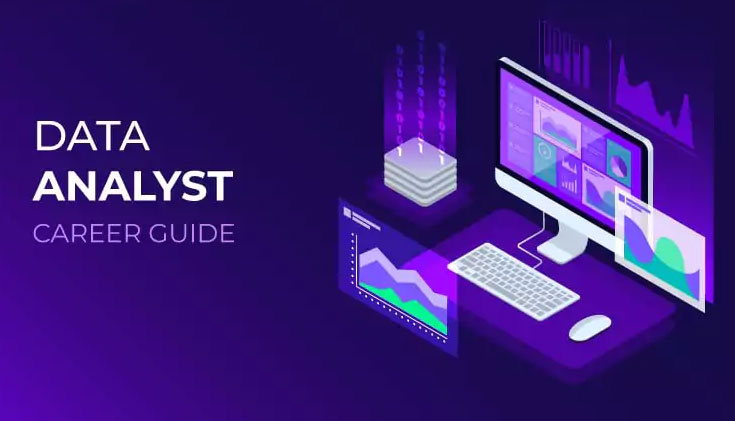In recent years, data science has emerged as one of the most sought-after career paths in the tech and business world. But is it truly the future? And is it a worthwhile career choice for you?
In this article, we’ll break down the importance of data science, the required skills, salary expectations, and whether it’s the right direction for your future.

What Is Data Science?
Data science is an interdisciplinary field that combines mathematics, statistics, and computer programming to extract valuable insights from structured and unstructured datasets. These insights help businesses make informed, data-driven decisions to achieve their strategic objectives.
A typical data science workflow involves:
- Collecting data from various sources
- Cleaning and preprocessing the data
- Analyzing patterns and trends
- Building predictive models
- Visualizing insights through dashboards and reports
Why Is Data Science Important?
As the world becomes increasingly digital, data is being generated at an unprecedented scale—from online shopping and video streaming to healthcare and finance. Every click, transaction, and interaction leaves behind a digital footprint.
Data scientists play a key role in turning this massive volume of raw data into actionable knowledge. Using tools like machine learning (ML) and artificial intelligence (AI), they help businesses:
- Improve operations
- Personalize customer experiences
- Detect fraud
- Optimize marketing strategies
- Forecast demand and trends
Where Is Data Science Used?
Data science applications are found across all major industries:
- E-commerce: Product recommendations (e.g., Amazon, Flipkart)
- Entertainment: Content suggestions (e.g., Netflix, Spotify)
- Finance: Fraud detection and risk modeling
- Healthcare: Predictive analytics and diagnostics
- Logistics: Route optimization (e.g., Google Maps, Swiggy)
- Education: Student performance prediction and personalization
Essential Skills for a Career in Data Science
To succeed in data science, a blend of technical and soft skills is essential:
Core Skills:
- Mathematics & Statistics: Descriptive and inferential stats, probability, regression
- Programming: Python (pandas, NumPy, scikit-learn) or R
- SQL: To query and manage relational databases
- Data Visualization: Tableau, Power BI, or libraries like matplotlib and seaborn
- Machine Learning: Supervised and unsupervised algorithms
- Big Data Tools (optional): Hadoop, Spark (for advanced roles)
Soft Skills:
- Problem-solving ability
- Business understanding
- Effective communication to convey insights to non-technical stakeholders
Is Data Science Hard?
Data science can be challenging—but it is manageable for anyone with curiosity and a willingness to learn. While the field requires a solid understanding of statistics and logic, many professionals come from non-technical backgrounds and succeed after acquiring the necessary skills.
Job Roles in Data Science
There are various entry points depending on your experience and skill set:
- Data Analyst
- Data Scientist
- Machine Learning Engineer
- AI Specialist
- Business Intelligence (BI) Analyst
- Data Engineer
Each of these roles contributes differently to the data value chain, from data collection to advanced modeling.
Salary Expectations
Data science professionals are in high demand, and their salaries reflect that:
- In the U.S.: Entry-level data scientists earn between $80,000 – $100,000 per year.
- In India: Freshers typically earn around ₹6–10 LPA, with experienced professionals earning ₹20+ LPA depending on skill and domain.
These figures continue to rise as demand for skilled talent grows globally.
Is a Technical Degree Mandatory?
While having a degree in computer science, mathematics, or statistics is helpful, it is not mandatory. Many successful data scientists have backgrounds in economics, engineering, physics, or business.
More than formal education, your ability to learn quickly, apply concepts, and build real-world projects matters most.
Common Tools Used by Data Scientists
Here are some of the most widely used tools and platforms in data science:
- Languages: Python, R
- Data Tools: Excel, SQL, Jupyter Notebooks
- Visualization: Tableau, Power BI
- Libraries/Frameworks: scikit-learn, TensorFlow, Keras, pandas, NumPy
- Cloud Platforms: AWS, Google Cloud, Azure (for advanced roles)
Why Pursue a Career in Data Science?
- High demand: Across every industry and domain
- Competitive salaries: Even for entry-level professionals
- Remote and flexible work options
- Opportunities to work on impactful, real-world problems
- Room for continuous learning and growth
Conclusion: Is It Worth It?
Absolutely. Data science is one of the most future-proof and rewarding careers in today’s digital economy. With growing reliance on data for business decisions, skilled professionals are needed more than ever.
If you’re ready to begin your journey into data science, consider enrolling with Console Flare. Their industry-led training programs provide hands-on experience with real datasets, project-based learning, and dedicated placement support to help you secure a high-paying role in the data industry.
For more such content and regular updates, follow us on Facebook, Instagram, LinkedIn




